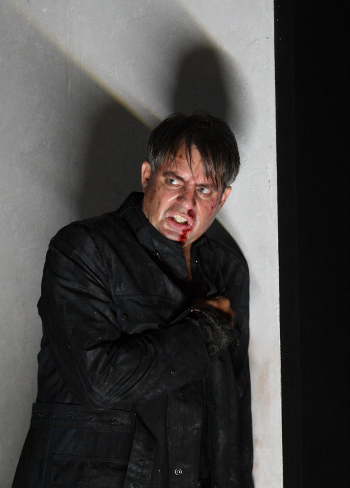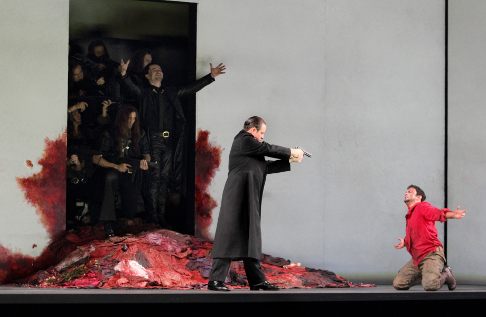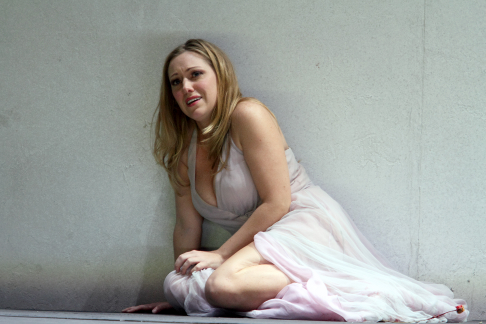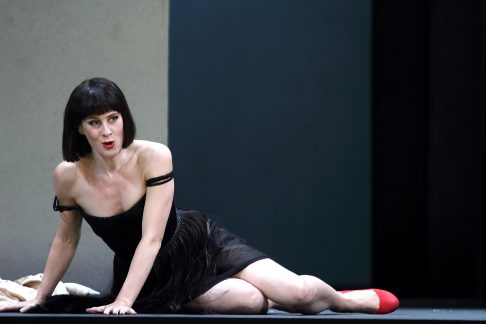
06 Nov 2014
Idomeneo, Royal Opera
Whether biblical parable or mythological moralising, it’s all the same really: human hubris, humility, sacrifice and redemption.
English Touring Opera are delighted to announce a season of lyric monodramas to tour nationally from October to December. The season features music for solo singer and piano by Argento, Britten, Tippett and Shostakovich with a bold and inventive approach to making opera during social distancing.
This tenth of ten Live from London concerts was in fact a recorded live performance from California. It was no less enjoyable for that, and it was also uplifting to learn that this wasn’t in fact the ‘last’ LfL event that we will be able to enjoy, courtesy of VOCES8 and their fellow vocal ensembles (more below …).
Ever since Wigmore Hall announced their superb series of autumn concerts, all streamed live and available free of charge, I’d been looking forward to this song recital by Ian Bostridge and Imogen Cooper.
Although Stile Antico’s programme article for their Live from London recital introduced their selection from the many treasures of the English Renaissance in the context of the theological debates and upheavals of the Tudor and Elizabethan years, their performance was more evocative of private chamber music than of public liturgy.
Evidently, face masks don’t stifle appreciative “Bravo!”s. And, reducing audience numbers doesn’t lower the volume of such acclamations. For, the audience at Wigmore Hall gave soprano Elizabeth Llewellyn and pianist Simon Lepper a greatly deserved warm reception and hearty response following this lunchtime recital of late-Romantic song.
For this week’s Live from London vocal recital we moved from the home of VOCES8, St Anne and St Agnes in the City of London, to Kings Place, where The Sixteen - who have been associate artists at the venue for some time - presented a programme of music and words bound together by the theme of ‘reflection’.
'Such is your divine Disposation that both you excellently understand, and royally entertaine the Exercise of Musicke.’
‘And there was war in heaven: Michael and his angels fought against the dragon; and the dragon fought and his angels, And prevailed not; neither was their place found any more in heaven … that old serpent … Satan, which deceiveth the whole world: he was cast out into the earth, and his angels were cast out with him.’
There was never any doubt that the fifth of the twelve Met Stars Live in Concert broadcasts was going to be a palpably intense and vivid event, as well as a musically stunning and theatrically enervating experience.
‘Love’ was the theme for this Live from London performance by Apollo5. Given the complexity and diversity of that human emotion, and Apollo5’s reputation for versatility and diverse repertoire, ranging from Renaissance choral music to jazz, from contemporary classical works to popular song, it was no surprise that their programme spanned 500 years and several musical styles.
The Academy of St Martin in the Fields have titled their autumn series of eight concerts - which are taking place at 5pm and 7.30pm on two Saturdays each month at their home venue in Trafalgar Square, and being filmed for streaming the following Thursday - ‘re:connect’.
The London Symphony Orchestra opened their Autumn 2020 season with a homage to Oliver Knussen, who died at the age of 66 in July 2018. The programme traced a national musical lineage through the twentieth century, from Britten to Knussen, on to Mark-Anthony Turnage, and entwining the LSO and Rattle too.
With the Live from London digital vocal festival entering the second half of the series, the festival’s host, VOCES8, returned to their home at St Annes and St Agnes in the City of London to present a sequence of ‘Choral Dances’ - vocal music inspired by dance, embracing diverse genres from the Renaissance madrigal to swing jazz.
Just a few unison string wriggles from the opening of Mozart’s overture to Le nozze di Figaro are enough to make any opera-lover perch on the edge of their seat, in excited anticipation of the drama in music to come, so there could be no other curtain-raiser for this Gala Concert at the Royal Opera House, the latest instalment from ‘their House’ to ‘our houses’.
"Before the ending of the day, creator of all things, we pray that, with your accustomed mercy, you may watch over us."
The doors at The Metropolitan Opera will not open to live audiences until 2021 at the earliest, and the likelihood of normal operatic life resuming in cities around the world looks but a distant dream at present. But, while we may not be invited from our homes into the opera house for some time yet, with its free daily screenings of past productions and its pay-per-view Met Stars Live in Concert series, the Met continues to bring opera into our homes.
Music-making at this year’s Grange Festival Opera may have fallen silent in June and July, but the country house and extensive grounds of The Grange provided an ideal setting for a weekend of twelve specially conceived ‘promenade’ performances encompassing music and dance.
There’s a “slide of harmony” and “all the bones leave your body at that moment and you collapse to the floor, it’s so extraordinary.”
“Music for a while, shall all your cares beguile.”
The hum of bees rising from myriad scented blooms; gentle strains of birdsong; the cheerful chatter of picnickers beside a still lake; decorous thwacks of leather on willow; song and music floating through the warm evening air.

Whether biblical parable or mythological moralising, it’s all the same really: human hubris, humility, sacrifice and redemption.
Having witnessed the selfless sacrifices made by the Israelite Jephtha and his daughter on Sunday when Bampton Classical Opera performed Maurice Greene’s oratorioJephtha in Oxford, Monday evening offered more parental hand-wringing and filial steadfastness at Covent Garden where Mozart’s Idomeneo received its first new production for 25 years.
Directing for the first time at the Royal Opera House, Austrian director Martin Kušej has not unreasonably abandoned Classical authenticity for indistinct modernism (the programme book is full of photographs of Hurricane Katrina and Vietnam War images), but has devised an unsubtle and at times confusing production. Set designer Annette Murschetz lines the front of the stage with a square white frame (with gaping skylight), an oversized wood-panel door on the left-hand sidewall. Behind the frame, interlocking black and white walls create a series of cubes and spaces which revolve, and through which various half-glimpsed individuals wander — rather aimlessly, but creating a general sense of journeying and searching. Colour is used rather blatantly by lighting designer Reinhard Traub: Ilia is bathed in a sanctifying white glow; Elettra’s Act 1 aria heralds an aquamarine sheen; bringing news that Idomeneo has been lost at sea while returning to Crete from Troy, the King’s confidant Arbace is immersed in lurid lime green, misty dry ice inferring the toxic death of the kingdom. But while such tonal gesture might seem straightforwardly symbolic, there are motifs in this production that defying reason and sense. Why do eleven prepubescent boys in white knee-highs and gym vests appear in Elettra’s first aria? Why do the Cretans celebrate the survival and return of Idomeneo, at the end of Act 1 by raising aloft a rubber shark that looks as if it has been pilfered from a 1970s Hollywood disaster movie? In Act 3, the stage is often foreshortened by a white back wall with a gaping, blood-splattered oblong orifice, from which spews a flowing mound of gory rubbish — not a very auspicious platform from which Ilia must sing her appeal to the wind to carry her love to Idamante.
 Krystian Adam as High Priest, Matthew Polenzani as Idomeneo and Franco Fagioli as Idamante
Krystian Adam as High Priest, Matthew Polenzani as Idomeneo and Franco Fagioli as Idamante
Before a note is heard, gleaming through the rain and storm surtitles tell us where we are and what has happened, a device employed at intervals throughout and a rather redundant one given that Mozart’s music, especially in the recitatives, fulfils this task admirably. As the overture strikes up, Idomeneo’s heavy mob, clad in menacing black and ray-bans (costumes, Heide Kastler) threaten and torture the captured Trojans, while the High Priest (a honey-voiced Krystian Adam) roams among them, weighed down by Gothic black locks, leather trench coat and gold bling — looking as if he has got lost on his way to a Hallowe’en rave. If the baddies and goodies are literally and figuratively signalled in black and white, then the populace are permitted a splash of warm Mediterranean ochres, olives and azure. Similarly, when he has charitably freed the Trojan prisoners, Idamante’s humanity is suggested by the replacement of his floor-length black coat with a coral cotton shirt; subsequently splashes of pinky red (Arbace’s dangling handkerchief, for example) expand into the encompassing red scarves and sheets draped around Ilia and the surrounding masses when she interposes herself as a sacrificial victim, thereby sparing Idamante’s life. With the intercession of The Voice, pronouncing that Idomeneo must cede the throne to Ilia and Idamante, a symbol which seemed to anticipate a bloody death is transformed into a medley of triumphal Roman togas as Ilia is borne off stage aloft — much like the shark.
American tenor Matthew Polenzani was sure and solid as Idomeneo; he acts with his voice (which is just as well as Kušej doesn’t give him much stage business), and uses his head voice to emotive effect. Polenzani shows that he can control his breathing, phrasing, trilling and power to considerable dramatic effect; and, in Act 3, Idomeneo’s final revelation of a real love for the son he cannot bear to kill and Polenzani’s gently murmured acceptance of his fate were greatly moving.
 Sophie Bevan as Ilia
Sophie Bevan as Ilia
Idamante was fiercely performed by Argentinian countertenor Franco Fagioli, but the singer’s impressive and unusually wide range, and striking power and vocal agility, are weakened by poor verbal clarity and an unusually ‘soprano-like’ tone that not all will like and which did not blend well with Polenzani’s noble warmth or Sophie Bevan’s crystalline soprano.
Sophie Bevan was an outstanding Ilia. Stunning in diaphanous chiffon, in the opening Act 1 ‘Padre, germani, addio’ Bevan looked as pure as her silvery soprano sounded, even though she had to begin singing from a prone position which can hardly have been conducive to vocal ease and comfort. ‘Se il padre perdei’ was infinitely warm and elegant, but surprising accompanied by coquettish gestures which would surely have left Idomeneo unsure as to her intentions.
As Elettra, Swedish soprano Malin Byström was Bevan’s equal. Ordered by Idomeneo to depart for Argos with Idamante, Elettra waited with gleeful anticipation, her white cloak masking the temptress’s slinky black dress, though red leather gloves and stilettos reveal her seductive intent. When Elettra turns and pockets the key of the panelled door, Idamante’s lack of free will is made clear; and Byström’s plush, gleaming tone in ‘Idol mio’ made it impossible for Fagioli to resist. Byström tired a little in the elaborate passages in Act 2 and in Act 3 her final aria of torment ‘D'Oreste, d'Ajace ho in seno i tormenti’, though still dramatic and effectively alternating dejection with fury, she was less focused of tone, the phrasing sometimes a little breathless. But, this was still a striking portrayal by Byström.
 Malin Byström as Elettra
Malin Byström as Elettra
As Arbace, French tenor Stanislas de Barbeyrac was superb. Dressed in bobble-hat, lumberjack checked shirt, and sporting skew-whiff spectacles with one lens clumsily patched (the moral blindness of the King’s confidant?) and trailing a battered accordion (eh?), de Barbeyrac sang with unfailing beauty; his Act 2 aria, ‘Se il tuo duol’, in which Arbace tries to salve Idomeneo’s anxiety and advises that another sacrificee may be substituted for Idamante, was enchantingly expressive.
French conductor Marc Minkowski, making his house debut, conducted fluently creating an organic flow from number to number. An energetic presence in the pit, his baton often raised perhaps unnecessarily high for the benefit of the cast, Minkowski perhaps didn’t quite draw enough ‘punch’ from his players during the overture, especially given the thuggery on stage, but during the evening there was much fine playing. The string playing during the accompanied recitatives was full of character and there were some confident solos, not least from the bassoon during Idomeneo’s Act 2 ‘Fuor del mar’.
Because the action is so frequently pushed to the front of the stage, the singers can often do little more than stand and deliver — although there is some clichéd floor/wall-writhing. As Mozart’s choruses play a significant part in the action, this is something of a problem, but Kušej finds a ‘solution’, in static gesturing: thus, as thus the Cretans prepare to bid Idamante and Elettra farewell, they draw from flimsy white plastic bags some floppy fake fish and wave them about like plastic boats — it all feels more like ‘drowning not waving’ despite their favourable observations about the propitious calm sea. When there is busy stage movement the result is indistinctiveness, as when this leaving taking is interrupted by insurrection and the dramatic chaos results in the chorus losing touch with Minkowski’s beat.
If, despite the heavy-handed but often abstruse symbolism, we were in any doubt about the ‘meaning’ of Kušej’s ‘concept’, the slogan on the curtain which falls after The Voice’s intervention — sung with Commendatore-like resonance by bass Graeme Broadbent — makes things absolutely ‘clear’: ‘Utopias fall. Rebellions decay. The rulers remain. And the people grow colder. Rigid. Under the sign of Pisces.’ Then, during the closing ballet, the revolving stage reveals: first, Idamante (black-clad) presenting his new bride (in traditional white nuptial-wear) to his people, the bloody detritus now purified by a white sheet; second, the purposively posed prepubescents, equipped with pistols and Kalashnikovs; then, a return of the matrimonial pair, white sheet now daubed with trickling blood; and finally the chorus, attired for the operating theatre in scrub gowns and caps. The message: the wounds of the world can never be healed?
Kušej’s curtain call inspired a volley of boos. But, if one doesn’t try to work out what the accordion or the gaggle of school boys are all about, the production is worth seeing — or rather hearing — for the quality of the singing and the musical commitment of voices and instrumentalists alike. Just try to ignore the shark.
Claire Seymour
Cast and production information:
Idomeneo, Matthew Polenzani; Idamante. Franco Fagioli; Ilia, Sophie Bevan; Elettra, Malin Byström; Arbace, Stanislas de Barbeyrac; High Priest, Krystian Adam; Voice, Graeme Broadbent; Director, Martin Kušej; Conductor, Marc Minkowski; Set designs, Annette Murschetz; Costume designs, Heide Kastler; Lighting design, Reinhard Traub; Dramaturg, Olaf A. Schmitt; Orchestra of the Royal Opera House; Royal Opera Chorus; Concert Master, Peter Manning. Royal Opera House, Covent Garden, Monday, 3rd November 2014.